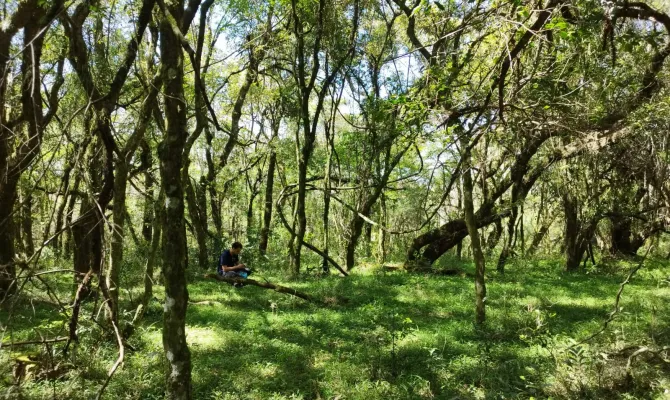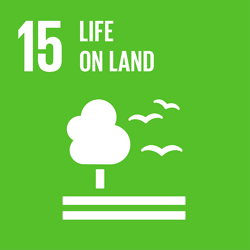
Thank you so much for your generous donation!
You're creating real change — your support truly matters!
Stay connected with the project you backed and with Nature Invest -- be part of the movement for a better planet.




Created by, Mário Tagliari
Organization Name: Faculdade Municipal de Educação e Meio Ambiente
Strategic Partner: Project Not Assign
The constitution of the Municipal Faculty of Education and Environment - FAMA is intertwined with the history of the Clevelândia Higher Education Foundation, which was born with attributions and competencies established in its Statute, from the partnership between public and private initiative, in the year 2000, with the main objective of maintaining the FESC Faculty.
This institution became a reality as a result of the entrepreneurial initiatives of Cleveland citizens. It is not a marketing venture, but a social action aimed at meeting the needs and aspirations of the community.
The Municipal Faculty of Education and the Environment - FAMA, was the result of the selflessness of many people, as proof that the development of this municipality comes about through collective effort and the building of a history of knowledge and achievements.
The Clevelândia Higher Education Foundation - FESC, a non-profit institution, was created by Municipal Law no. 1.610 of September 30, 1999, managed by the Board of Trustees, and began its academic activities with the Business Administration Course with an emphasis on Agribusiness, authorized to operate by Decree no. 3.755, of March 21, 2001, and recognized on May 17, 2005, by Decree no. 4.827/05.
The following year, SETI/CEE authorized the Geography - Full Degree course, by Decree no. 5.493/02, which was recognized by Decree no. 6.629, on March 9, 2006. On January 31, 2006, the Systems Analysis and Development course was authorized by Decree no. 6.069/06, with 40 students enrolled, and finally the Pedagogy course was implemented, authorized to operate by the opinion of CEE/Paraná n⁰ 219/10 of November 8, 2010.
Seres/MEC Notice 01 of August 9, 2011 established a system migration regime for private higher education institutions linked to the State Education Councils, which came under the jurisdiction of the National Education Council.
In 2015, a study began with the Clevelândia City Council and the State Government, with the intention of municipalizing the higher education offered there by FESC.
Municipal Law No. 2,542/2015 of October 20, 2015, created the Faculdade Municipal de Educação e Meio Ambiente - FAMA (Municipal Faculty of Education and the Environment), and the request for FAMA's accreditation was submitted to the State Education Council in December 2015.
On March 14, 2016, Resolution No. 30 of the Secretary of State for Science, Technology and Higher Education (SETI), of March 9, 2016, ratified Opinion No. 02/16 of the Chamber of Higher Education of the State Education Council, ruling in favor of the creation of FAMA.
By DECREE No. 3755 of March 31, 2016, the governor of the state accredited the Municipal Faculty of Education and Environment - FAMA - to the state education system, incorporating all the students regularly enrolled at FESC, from the Administration, Technology in Systems Analysis and Development and Pedagogy courses, and announcing FAMA in the national context as "the first public municipal faculty maintained with resources from environmental preservation".
This fact has led the HEI to develop theoretical and practical reorganization actions that include offering higher education in undergraduate and bachelor's degree courses based on the Environment and Sustainability axis. In this proposal, FAMA will expand its actions as a mechanism for the proliferation of socio-environmental responsibility practices, showing that the municipal resources it receives from the Ecological ICMS are the driving force behind an academic education based on environmental conservation principles.
Considering that the ecological ICMS was born under the aegis of compensation, it has evolved into an incentive mechanism for environmental conservation, representing a promising alternative in the composition of public policy instruments.
In order to consolidate the proposal, the organization and structuring of pedagogical and socio-environmental actions is based on work fronts that are ritualized through the Legalization of Institutional Acts, the Pedagogical Didactic Organization focused on teaching, research and extension, and the organization of the regularity of academic life.
The proposals that are evident in the institution's pedagogical legal guidelines go hand in hand with the Institutional Strategic Planning policy, which aims to identify and propose topics that can be converted into guidelines and actions from the perspective of FAMA's sustainable development in its mission of interaction in the external and internal contexts.
Intense logging in the 20th century, together with the expansion of agriculture and urbanization, were determining factors in the degradation of the Atlantic Forest and its phytophysiognomies, such as the Araucaria Forest (also known as the Mixed Ombrophilous Forest). Protected areas are just one of the strategies aimed at containing the advance of environmental degradation and deforestation. However, our three units were created in areas that have been previously modified by human actions, and therefore require intervention to accelerate ecological processes. By recovering the areas, especially with araucarias - which is considered an ecological keystone species - a series of ecosystem services will be unleashed, ranging from support, regulation, provision and cultural services. Our aim is to accelerate the recovery of these remnants, increase the storage of carbon and biomass and favor the socio-ecological interactions of this threatened sobiobiodiversity in southern Brazil.
Our project aims to accelerate the process of ecological succession through environmental restoration. We will try to reforest degraded areas of Araucaria Forest in three Conservation Units managed by the Clevelândia City Council with native species. Restoration will only take place with native flora species (cinnamon trees, açoita-cavalo, araucarias, butiás, erva-mate, branquilho, canafístula, paineira, cerejeira-do-mato, pitanga, areticum, jabuticaba and others). The succession process will be accelerated so that we can have an understorey characteristic of the Mixed Ombrophilous Forest. So far, more than 1,000 species have been planted in the Mozart Rocha Loures Municipal Nature Park and more than 1,500 seedlings will be donated to the local community between 2022 and 2023.
The activities will mainly involve active forest restoration. Resources will therefore be needed for training, the purchase of materials, the purchase of seedlings (if they are not donated), food and transportation. All reforestation activities will be carried out only with species of flora native to the phytophysiognomy (cinnamon trees, araucaria, yerba mate, areticum, branquilho, bush cherry, pitanga, araçá, canafístula, paineira, jaboticabeiras, cedro-rosa, açoita-cavalo, tarumã-preto, angico-gurucaia, vacum and others. Around 1,000 seedlings have already been planted (between 2022 and 2023), in addition to more than 1,500 donated to the local community. In addition, we will also use the funds to offer courses, workshops, training and the purchase of materials for the Municipal Faculty of Education and the Environment - FAMA. FAMA's Junior Company will be responsible for managing the funds from the initiative and will not be for profit. All actions will be reverberated to the Faculty to manage the proposed activities. We reiterate that there is no profit motive among the participants and/or any collaborators involved in the Faculty and Municipal Management. All proceeds will go to FAMA, with transparent reporting of any and all expenses.
Parque Natural Municipal Mozart Rocha Loures